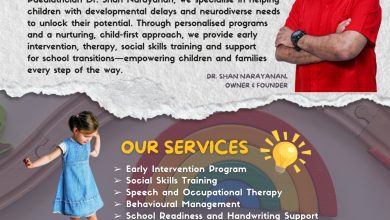Eye Health
By Dr S.S. Gill
Ipoh Echo’s EYE HEALTH series continues with Consultant Eye Surgeon Dr S.S. GILL talking to us about THE TWITCHING EYELID.
Most eyelid twitches are MINOR and not dangerous. Thankfully, they also do not last for very long although sometimes that may rarely last for a few months. The MORE SERIOUS or problematic form of eyelid twitching is called blepharospasm or hemifacial spasm. Here, Dr Gill speaks to us more about the other causes of eyelid twitching.
Fatigue: A lack of sleep, whether due to stress or other reasons, can trigger eyelid spasms. A good night’s rest may not only affect your mood the next day, but also your eyes. Sleep is a way to rejuvenate and refresh not only your body but also your eyes, “recharging” them for the day ahead. When you don’t get sufficient sleep, your eyes will feel tired, just like how the rest of your body may feel, says Dr Gill.
We spend about one-third of our entire lifetime sleeping. This is not wasted time because from the moment we slip into sleep, a whole cascade of events take place involving the brain, eyes, immune function, hormones, skin, respiratory system and digestive system. Inadequate sleep results in fatigue that can only be replaced by the natural process of getting the hours of sleep you have been deprived of. There is no other way to solving this!
Dry eyes: Dry eyes are very common among postmenopausal women, the elderly, those who spend hours at the computer, those who are on medication such as antihistamines and antidepressants and also among those who wear contact lenses for long hours. Should you start getting an eyelid twitch, it’s best to see your eye doctor for a dry eye evaluation, because many treatments are now available.
Eye allergies: People who suffer from eye allergies with symptoms of itchy and watery eyes may have twitching eyelids too. This is because histamine is released into the eyelid tissues and this results in twitching of the eyelids. If you self-medicate with antihistamine eye drops, do be careful because this can cause some dry eyes too. Remember, dry eyes can be an underlying cause for eyelid twitching! So, it would be best to seek professional advice should you suffer from this.
Nutritional imbalances: Nutritional deficiencies like magnesium deficiency can trigger spasms of the eyelid. Having a balanced diet and eating healthy will definitely help.
Remedies for eye twitching
The first thing to do is to identify the underlying cause or trigger factor for the eyelid twitching. If it is excessive caffeine, then it’s time to take it easy on those cups of coffee. If it is stress, do find ways to de-stress from time to time. If it is dry eyes, then lubricant eye drops will often help. These can be purchased over the counter quite easily. If it is because of lack of sleep, then there is no easy way out but to get that sleep that you lack!
For the more serious blepharospasm and hemifacial spasms, you would need to see the ophthalmologist or neurologist. Medication like anxiolytics (anti-stress medication) may help some patients. If this does not help, then BOTOX (botulinum toxin) injections into the muscles surrounding the eyes (periorbital area) may help. This relaxes the muscles for several months. The BOTOX injection does not last forever and so may need to be repeated at three to six months intervals. This form of treatment has proven to be successful in most cases.
As a last resort, and only if absolutely necessary, a neurosurgical procedure may be done to relieve pressure on the nerve. This is only performed as a final measure if other forms of treatment do not help, as this type of surgery runs a risk of serious complications.
For more information, call Gill Eye Specialist Centre at Hospital Fatimah
(05-545 5582) or email: gilleyecentre@dr.com.


